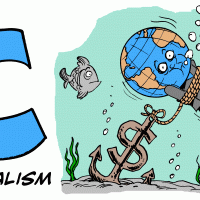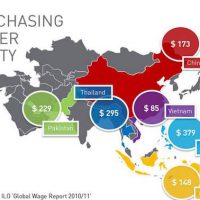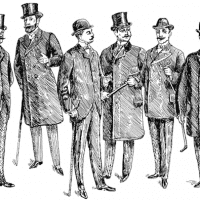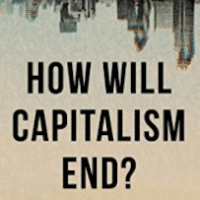-
Alain Badiou: “The alleged power of capitalism … today is merely a reflection of the weakness of its opponent.”
My father was a socialist, who participated in the Resistance against the Nazis. My mother leaned more towards anarchism. My first philosophy teacher, Jean Paul Sartre, was a fellow traveller of the French Communist Party. When I was a teenager, there was a terrible colonial war in Algeria and I stood up against it. When I was 30, May ‘68 happened, a huge movement of young people and workers. In short, my entire education led me towards politics in its revolutionary and communist form.
-
Capitalism? Yes, let’s have a trial
In announcing his long-avoided royal commission into banking, Malcolm Turnbull said that “it will not put capitalism on trial”. What a shame!
-
Making merry on bitcoin
Bitcoin has left the world of finance gasping. Although the total market value of all that cryptocurrency in circulation is only a fraction of the value of the world’s financial assets, the rapid rise in the value of the currency has made it the most wanted of those assets. On January 1, 2017, the currency was trading between $972 and $990 a unit. By December 7, it was trading between $14,063 and $17,363.
-
Two billion dollars in stolen wages were recovered for workers in 2015 and 2016—and that’s just a drop in the bucket
The last four decades have been marked by rising wage inequality, with the vast majority of American workers experiencing wage stagnation while those at the top rung of the economic ladder reap the benefits of growth in productivity. These dynamics mean that many workers struggle to make ends meet; in 2016 one in five families in which at least one person worked were living below 200 percent of the federal poverty line (U.S. Census Bureau 2017).
-
Taxes, inequality, and class power
No doubt about it, the recently passed tax bill is terrible for working people. But as Lance Taylor states in a blog post titled “Why Stopping Tax ‘Reform’ Won’t Stop Inequality”: “Inequality isn’t driven by taxes—its driven by the power of capital in relation to workers.” Said differently we need to concentrate our efforts on shifting the balance of class power. And that means, among other things, putting more of our energy into workplace organizing and revitalizing the trade union movement.
-
Capitalism’s life source: the domestic and social basis for exploitation
Social reproduction theory (SRT) sounds quite intimidating, but the (rather grandiose) anthology of big words masks a relatively simple question: if capitalist production is fundamentally the production of commodities, and it is workers who produce such commodities, who ‘produces’ the worker?
-
The productive base as the ground of society and history: Marx’s base-superstructure theory
Base-Superstructure Theory (BST) is Marx’s guiding general theory, but is long misunderstood. Deeply embedded in a monumental corpus of system-challenging analysis, it has become lost in secondary interpretations with partial takes and opposed propagandas militating against coherent comprehension.
-
Capitalism, exterminism and the long ecological revolution
teleSUR spoke to Monthly Review editor John Bellamy Foster about climate change & the need to fight for an ecosocialist, revolutionary alternative to the profit-driven world capitalist system.
-
Debt comes for us all
“DON’T LET YOUR CHILDREN GO INTO CRIPPLING DEBT LIKE I HAVE!” I shout, as I and a group of students with SENS-UAW make our way to a major intersection just off Union Square. We wave signs, hoist our banner and merge into the crowd. We are protesting the new GOP tax bill, which will affect the lives of current, previous, and prospective students in critical and long-lasting ways.
-
Do Purchasing Power Parity exchange rates mislead on incomes? The case of China
Ever since Larry Summers and Alan Heston produced what become known as the “Penn World Tables” comparing prices and thereby the purchasing power of currencies across countries, the urge to use some deflator of market exchange rates to compare incomes across countries has been strong.
-
Employers would pocket $5.8 billion of workers’ tips under Trump administration’s proposed ‘tip stealing’ rule
On December 5, the Trump administration took its first major step toward allowing employers to legally pocket the tips earned by the workers they employ. The Department of Labor (DOL) released a proposed rule that would allow restaurants to take the tips that servers earn and share them with untipped employees such as cooks and dishwashers.
-
Evgeny Pashukanis: Commodity-form theory of law
Whether one believes that law is provided by God (Natural Law), is created by human intellect (Positivism), a gendered institution perpetuating patriarchy (Feminism) or the maintainer of the status quo against marginalised groups (Critical Legal Studies), undergirding those beliefs is the assumption that law is autonomous.
-
The American savings crisis, explained
When you lay all that out, Americans’ terrible saving rate stops looking like such a mystery. In fact, it looks downright rational.
-
The financial aristocrats will eat themselves
Even as far back as 1894, Karl Marx’s work saw that capitalism would devour its agents, writes DIEGO FUSARO.
-
The crisis in neoliberalism and its ramifications
The neoliberal model that has dominated mainstream politics and economics for decades is in crisis.… Mass dissatisfaction has joined with the growing realisation by the managers of the capitalist system that neoliberal policies are incapable of dragging the world economy out of the rut in which it now finds itself 10 years after the onset of the global financial crisis.
-
Review of Art and Value by Dr. Nizan Shaked
Art and Value: Art’s Economic Exceptionalism in Classical, Neoclassical and Marxist Economics reveals the irreconcilable differences between the Marxist economic definition of the term ‘value’ and its other uses in relation to the art object. It corrects the faulty assumption that rare or historical objects bear intrinsic value, symptomatic of capitalist worldview. Beech’s analysis of art’s value-form is critical to unpacking the double ontological condition of art as both an object of collective symbolic value and a hoard of monetary value, since the two operate in mutually exclusive spheres, yet function to constitute one another. The book can help us understand the capitalist sleight of hand that allows art to flicker between two forms of being, making profit appear as value, and value appear as significance (and vice versa), the toggling between the two facilitating the transfer of commonly held symbolic value in support of the individual accumulation of wealth.
-
The 2016 Survey of Consumer Finances paints a grim picture of working class finances
Martin Hart-Landsberg takes a look at the tragedy of what life is like for the working class. Allowing for us to directly see what we already know, that US capitalism works to enrich the few at the expense of the many.
-
The future of capitalism
Looking at the present and future system of capitalism, there is a vital crisis at the heart of it all. Democratic capitalism, starting out in the 18th century, has had its ups and downs but even Marx, Keynes, Rosa Luxemberg, and Kondratieff have all failed to establish theories to break out of the capitalist system.
-
Capitalism and punishment
David Russio takes a look into the punishments (deaths) that come from capitalism. For is it really bringing balance to the destruction that it causes. That seems to be the loaded question we all know the answer to.
-
“Colombia is safe for business, but not for people”
Murders of trade unionists and social leaders, paramilitary activity, coca production… If we only paid attention to the mainstream media we would not get the idea that these problems are actually growing in Colombia, one year after the peace agreement between the Colombian government and the FARC came into place. To get a better picture and understand how all these elements connect to US policy and corporate interests, we interviewed Daniel Kovalik, a lawyer and human rights activist who has long been involved in the struggle for peace and justice in Colombia.




















